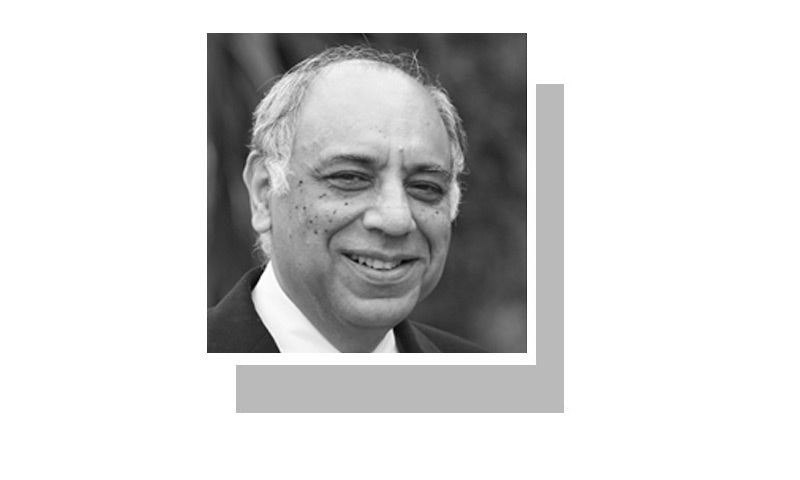
ONCE upon a time, there was an amenity plot assigned as a playground to a school in a central part of Karachi. Then, one day, the government of Pakistan took it over and handed it to the defence ministry, then the plot was sub-leased for commercial use, prompting the late Ardeshir Cowasjee to direct ‘A plea to the Lord Chief Justice’ in this newspaper on June 14, 2009.
Lo and behold, the then lord chief justice took note; the case was brought to court, a bench constituted, and a judgement pronounced on Oct 20, 2009, with the leading opinion by then justice Jawwad S. Khawaja. What follows from court documents is a summary of this astounding land grab and an update of its status following the judgement.
According to concerned citizens, the five-acre plot in Jamshed Town was transferred by the government of Pakistan to the City District Government Karachi on Aug 12, 1976, for the Lines Area Redevelopment Project, and designated in the master plan as an amenity plot to be used as playground. It was subsequently claimed by the government that while contiguous land was indeed transferred to CDGK, this particular plot was excluded and remained part of the Karachi Cantonment.
Is suo motu action an exercise in futility?
Following this reclamation, on Dec 19, 2002, then military ruler Gen Pervez Musharraf granted a 90-year lease on the plot to the Army Welfare Trust at the nominal annual rent of Rs6,020. The court noted that, contrary to its name that suggests some institutional affiliation with the Pakistan Army, the AWT was registered as an NGO — a private society, under the Societies Registration Act, 1860. It was, however, a fact that Musharraf was at the time the ex-officio patron of the AWT in his capacity as chief of army staff.
On July 31, 2006, the AWT in turn transferred the land to a private party (Makro-Habib Pakistan Ltd) by way of a sub-lease for an initial term of 30 years, receiving an advance rent of Rs100,000,000 based on a variable annual amount of at least Rs17,500,000 and a maximum equivalent to one per cent of the annual turnover of Makro-Habib, which was initially incorporated as a joint venture between the Dutch multinational SHV and the Pakistani corporate group House of Habib. SHV held 70pc of the equity in the venture, but later divested its share to the House of Habib with permission to use the ‘Makro’ brand name. After the execution of the sub-lease, Makro-Habib constructed a wholesale centre on the plot.
Following a meticulous examination of the argument advanced by the government, AWT, and Makro-Habib that the playground was not transferred to CDGK, the Supreme Court concluded it was “wholly untenable.” Based on the finding that the land was not the property of the defence ministry, both its lease of the land to AWT and the subsequent sub-lease to Makro-Habib were declared null and void. Makro-Habib was allowed “three months from the date of the judgement, to remove its structures and installations from the playground, restore it to the same condition as existed on the date of the sub-lease and hand over its vacant possession to the CDGK”.
The apex court was also “led to the inescapable conclusion that government land was virtually thrown away at great financial loss to the government and in utter disregard of the CLA [Cantonment Land Administration] Rules”.
In addition, the Supreme Court referred specifically to a paragraph in a defence ministry summary for the chief executive dated Sept 20, 2002, which read: “Since [CLA] Rules do not permit leasing out defence land free of cost, MoD [defence ministry] supports payment of nominal premium and rent by AWT, being a welfare organisation.” With reference to this paragraph, the court observed: “We have also noted the cynical play with the CLA Rules” and that the document “presents a damning indictment of dictatorial one-man rule”.
The aggrieved parties filed a review petition against the decision, which was dismissed by the Supreme Court on Aug 27, 2015. But even after dismissal of the review petition, the orders of the court remain outstanding. The Makro-Habib structure continues to stand, although without transacting any business. The result is a lose-lose proposition in which a valuable property is fulfilling neither its original nor its engineered purpose.
This unsatisfactory outcome prompts the following questions: how is it possible that a judgement of Pakistan’s apex court can remain unimplemented for nine years? What is the recourse for citizens if its judgements can be stonewalled even after the dismissal of review petitions? Why does it not have the powers to have its judgements implemented?
These are important questions and deserving of another plea to the lord chief justice: please take suo motu notice of why judgements on prior suo motu notices cannot be implemented. And, if they cannot, please explain why the practice deserves to continue in the future.
The writer was the dean of the School of Humanities and Social Sciences at Lums.
Published in Dawn, April 10th, 2018











































